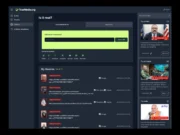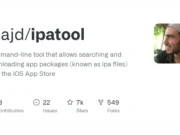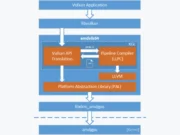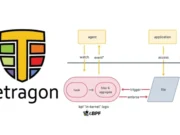ELFEN is a dockerized sandbox for analyzing Linux (file type: ELF) malware. It leverages an array of open-source technologies to perform both static and dynamic analysis.
Results are available through both the GUI and API. Currently, ELFEN supports the analysis of ELF binaries for the following architectures:
- x86-64
- MIPS 32-bit big/little-endian
- PowerPC 32-bit big-endian
- ARMv5 32-bit little-endian
Getting Started
Prerequisite
Install docker and docker compose.
Setup
- Clone the ELFEN repository
$ git clone --recursive link2. Modify the DJANGO secret key in ELFEN/settings.py#L30. The secret key is used by Django for cryptographic purposes and must be secure. It can be generated in the following manner, for example:
import secrets
# ASCII characters range: 33-126
ascii_chars = [chr(i) for i in range(33, 127)]
# Length of SECRET_KEY must be 50 characters minimum
keylen = 60
''.join(secrets.choice(ascii_chars) for i in range(keylen))3. ELFEN uses fixed credentials for the following services. Modify them as needed.
- MySQL. Refer to
docker/mysql/Dockerfile.- Ensure changes, if any, are also mirrored to
ELFEN/settings.py#L101-L103
- Ensure changes, if any, are also mirrored to
- PostgreSQL. Refer to
docker/postgres/Dockerfileanddocker/postgres/init.sql.- Ensure changes, if any, are also mirrored to
ELFEN/settings.py#L115-L117andELFEN/settings.py#L136
- Ensure changes, if any, are also mirrored to
- RabbitMQ. Refer to
docker/rabbitmq/Dockerfile.- Ensure changes, if any, are also mirrored to
ELFEN/settings.py#L134
- Ensure changes, if any, are also mirrored to
$ mkdir data && cd data && mkdir mysql postgres rabbitmq && cd ..
$ ls -1q data/
mysql
postgres
rabbitmq
$ mkdir -p media/web6. Modify the docker-compose.user.yml to contain your UID and GID. By default, both are set to 1000:1000.
# UID
$ id -u
1000
# GID
$ id -g
10007. Build the ELFEN docker system.
$ docker compose build8. Bring up ELFEN services.
$ docker compose -f docker-compose.yml -f docker-compose.user.yml up
...
...
elfen-web-1 | Performing system checks...
elfen-web-1 |
elfen-web-1 |
elfen-web-1 | System check identified no issues (0 silenced).
elfen-web-1 | August 31, 2023 - 10:46:41
elfen-web-1 | Django version 4.1.7, using settings 'ELFEN.settings'
elfen-web-1 | Starting development server at http://0.0.0.0:8000/
elfen-web-1 | Quit the server with CONTROL-C.A Django superuser, admin is also created with password admin. ELFEN should now be available on the host at in debug mode.
Note: ELFEN has only been tested on Ubuntu 22.04.2 LTS host.
$ docker --version
Docker version 24.0.4, build 3713ee1
$ lsb_release -a
No LSB modules are available.
Distributor ID: Ubuntu
Description: Ubuntu 22.04.2 LTS
Release: 22.04
Codename: jammy
$ uname -a
Linux oni 6.2.0-26-generic #26~22.04.1-Ubuntu SMP PREEMPT_DYNAMIC Thu Jul 13 16:27:29 UTC 2 x86_64 x86_64 x86_64 GNU/LinuxTroubleshooting
See the troubleshooting document for known issues.
API
ELFEN provides an API to submit samples and retrieve analysis reports. Ready-to-use scripts are available under the scripts directory.
API Token
To retrieve your API token, visit and login with your username and password. If you’re using the default Django superuser, the credentials are admin:admin.
You should now see two values: access and refresh tokens. The access token will be valid for 7 days after which it will have to be re-generated (visit ) using the refresh token (valid for 30 days).
Submitting Samples
Copy the access token into scripts/submit_samples.py. Given a file containing newline-separated full paths to samples, this script can be used to submit them to ELFEN. The output JSON is a mapping between the submitted sample path and ELFEN task UUID.
$ cat demo_submit
/full/path/to/1af85af86c92c06dd2d127e0b462679f60d085cfc28cf13c79988b7ef50b95fe
$ python submit_samples.py -f demo_submit -o output.json
Submitted /full/path/to/1af85af86c92c06dd2d127e0b462679f60d085cfc28cf13c79988b7ef50b95fe successfully.
$ cat output.json
{
"/full/path/to/1af85af86c92c06dd2d127e0b462679f60d085cfc28cf13c79988b7ef50b95fe": "4122f552-1897-48d0-b906-bb144c6e4010"
}Retrieving Full Analysis Report
Copy the access token into scripts/get_report_task.py. Given a task UUID, it retrieves the full analysis JSON report.
$ python3 get_report_task.py -u 4122f552-1897-48d0-b906-bb144c6e4010 -o report.json
Report retrieved successfully for 4122f552-1897-48d0-b906-bb144c6e4010.
$ du -h report.json
56K report.jsonRetrieving Analysis Report For Given Backend
ELFEN leverages multiple backends to conduct analysis. Some backends like elfheader and capa are associated with static analysis, whereas others such as fileops, c2config are associated with dynamic analysis. Reports can be retrieved for a given backend using scripts/get_report_backend.py. Copy the access token into the script.
$ python3 get_report_backend.py -u 4122f552-1897-48d0-b906-bb144c6e4010 -b procops -o report.json
Report retrieved successfully for procops for 4122f552-1897-48d0-b906-bb144c6e4010.
$ cat report.json | jq
{
"submission_uuid": "4122f552-1897-48d0-b906-bb144c6e4010",
"backend": "procops",
"report": {
"errors": false,
"error_msg": [],
"data": [
{
"ts": "05:10:03.360807 UTC",
"pid": 130,
"procname": "Ba9iedKN",
"func": "getpid",
"args": "",
"ret": 130
},
{
"ts": "05:10:03.361229 UTC",
"pid": 130,
"procname": "Ba9iedKN",
"func": "getpid",
"args": "",
"ret": 130
},
{
"ts": "05:10:03.363962 UTC",
"pid": 130,
"procname": "Ba9iedKN",
"func": "fork",
"args": "",
"ret": 132
},
{
"ts": "05:10:03.388397 UTC",
"pid": 132,
"procname": "Ba9iedKN",
"func": "fork",
"args": "",
"ret": 133
}
]
}
}
















.webp)



.webp)






